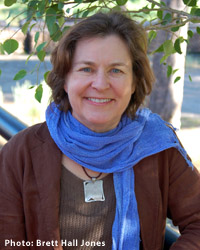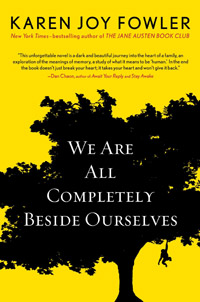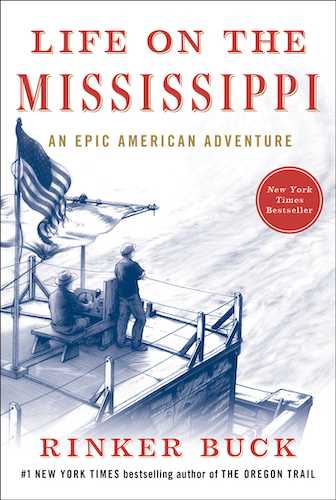Between the Happening and the Telling
Karen Joy Fowler’s new novel puts an unusual spin on family dysfunction
Rosemary Cooke, the narrator and protagonist of Karen Joy Fowler’s new novel, We Are All Completely Beside Ourselves, the 2014 Nashville Reads book selection, is interested in memory and language and story—specifically the myriad ways in which stories can be remembered, told, and interpreted. “[T]he happening and the telling are very different things,” she writes in this fictional memoir. “This doesn’t mean that the story isn’t true, only that I honestly don’t know anymore if I really remember it or only remember how to tell it. Language does this to our memories—simplifies, solidifies, codifies, mummifies. An oft-told story is like a photograph in a family album; eventually, it replaces the moment it was meant to capture.”
 Rosemary has been struggling with the story of her own life ever since she was five years old. That’s when her sister Fern was taken away, inflicting a trauma so deep that neither Rosemary nor her family has ever fully recovered. “Take any memory from my early childhood and I can tell you instantly whether it happened while we still had Fern or after she’d gone,” she writes. “I can do this because I remember which me was there. The me with Fern or the me without? Two entirely different people.”
Rosemary has been struggling with the story of her own life ever since she was five years old. That’s when her sister Fern was taken away, inflicting a trauma so deep that neither Rosemary nor her family has ever fully recovered. “Take any memory from my early childhood and I can tell you instantly whether it happened while we still had Fern or after she’d gone,” she writes. “I can do this because I remember which me was there. The me with Fern or the me without? Two entirely different people.”
Fern is not a biological sibling, nor even a human one. Rosemary’s father is a professor of psychology interested in studying the differences between human and primate learning and communication. Not long after Rosemary’s birth, he brings home an infant chimpanzee to raise as a sibling to Rosemary and her older brother, Lowell. A revolving door of graduate students is charged with administering daily behavioral and cognition tests to both baby and chimp. For five years, Rosemary and Fern grow up side by side, bonded as sisters with a special ability to communicate.
 Then Fern is removed from their home and rarely spoken of again. Rosemary blames her father, whom she describes as “a pedant to the bone. Every exchange contained a lesson, like the pit in a cherry. To this day, the Socratic method makes me want to bite someone.” After Fern’s loss, Rosemary’s mother goes into a deep depression, finally emerging in an altered state: “Her catatonia had been replaced with an implausible buoyancy. Lowell and I were fine. We were such good kids, basically. Smart kids. At least we all had our health! Every gangplank a seesaw.” That’s before it becomes clear that Lowell takes the loss of his “little sister” equally hard and is troubled in ways his parents don’t recognize.
Then Fern is removed from their home and rarely spoken of again. Rosemary blames her father, whom she describes as “a pedant to the bone. Every exchange contained a lesson, like the pit in a cherry. To this day, the Socratic method makes me want to bite someone.” After Fern’s loss, Rosemary’s mother goes into a deep depression, finally emerging in an altered state: “Her catatonia had been replaced with an implausible buoyancy. Lowell and I were fine. We were such good kids, basically. Smart kids. At least we all had our health! Every gangplank a seesaw.” That’s before it becomes clear that Lowell takes the loss of his “little sister” equally hard and is troubled in ways his parents don’t recognize.
An extremely talkative child—a quality prized by researchers but not necessarily by anyone else— Rosemary is admonished to comply with social norms as she begins school for the first time. “When you think of two things to say, pick your favorite and only say that,” her mother advises, a rule she later modifies to one in three. Some of her parents’ advice is warranted—Rosemary has adopted aspects of chimp behavior and struggles to fit in with her less expressive and less tactile peers, who call her “monkey girl” and taunt her mercilessly. At least the other kids don’t behave as though Fern never existed, as Rosemary’s parents do, however. “If you don’t count the taunting at school, then the only people who talked much about Fern were my grandma Donna, until Mom made her stop, and my brother Lowell, until he left us,” Rosemary says. “Each had too obvious an agenda to be reliable: Grandma Donna wishing to shield our mother from any share of blame, Lowell stropping his stories into knives.”
Fowler has written a readable and compelling story with fascinating descriptions of the fictional interactions between Fern and her adoptive family. The book also includes actual details from similarly “cross-fostered” chimps in experiments beginning in the 1930s but concentrated primarily in the 60s and 70s. Filled with intensely dramatic scenes, humor both self-deprecating and acerbic, and wonderfully clever turns of phrase, We Are All Completely Beside Ourselves takes the reader into an unfamiliar world of truly unique family dysfunction, psychological experimentation, and animal-rights activism. At the same time, it includes meditations on how we communicate (“Language is such an imprecise vehicle I sometimes wonder why we bother with it,” Rosemary writes), what family means, and whether there is such a thing as objective truth.
As for Rosemary, she has always dreamed of a rewrite: “There are moments when history and memory seem like a mist, as if what really happened matters less than what should have happened. The mist lifts and suddenly there we are, my good parents and their good children, their grateful children who phone for no reason but to talk, say their good-nights with a kiss, and look forward to home on the holidays. I see how, in a family like mine, love doesn’t have to be earned and it can’t be lost. Just for a moment, I see us that way; I see us all. Restored and repaired. Reunited. Refulgent.”
[This review originally appeared on September 10, 2013, in connection with Karen Joy Fowler’s appearance at the twenty-fifth annual Southern Festival of Books in Nashville.]
The Nashville Reads Kickoff event, “Drop Everything and Read,” will be held March 3, 2014, at the Nashville Public Library at 2 p.m. Guest readers include Mayor Karl Dean, novelist Ann Patchett, and songwriter Janis Ian, among others. Refreshments will be served. The event is free and open to the public.


